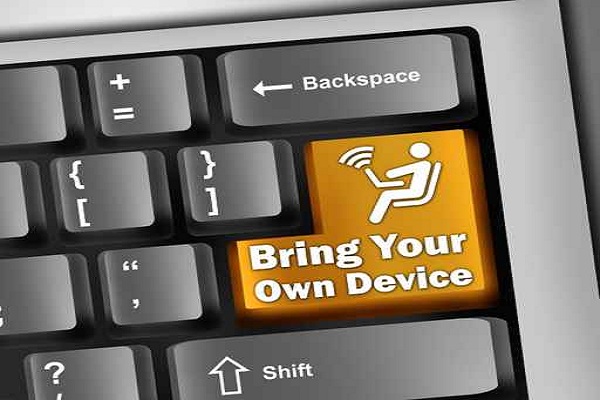BYOD to kill off corporate-owned devices in 40% of enterprises
Gartner research suggests European firms are falling behind in BYOD adoption.

Nearly 40 per cent of CIOs expect to stop giving workers corporate-owned devices by 2016, as the adoption of Bring Your Own Device (BYOD) programmes hots up.
This is according to the findings of a worldwide survey by market watcher Gartner into CIO attitudes to BYOD.
The analyst claims BYOD adoption is most common in mid-to-large enterprises with between 2,500 and 5,000 employees, with US firms more likely to embrace the trend than their European counterparts.
In fact, the organisation claims Europe has the lowest BYOD adoption rate of all the regions covered by its research.
The enterprise should subsidise only the service plan on a smartphone.
This could be because some organisations have a poorer grasp of the benefits BYOD can provide, making it difficult to justify introducing a formal business policy on the topic.
David Willis, vice president and distinguished analyst at Gartner, said the business case for BYOD needs to be better evaluated.
"Most leaders do not understand the benefits, and only 22 per cent believe they have made a strong business case," said Willis.
Sign up today and you will receive a free copy of our Future Focus 2025 report - the leading guidance on AI, cybersecurity and other IT challenges as per 700+ senior executives
"Mobile initiatives are often exploratory and may not have a clearly defined a quantifiable goal, making IT planners uncomfortable.
"If you are offering BYOD, take advantage of the opportunity to show the rest of the organisation the benefits it will bring to them and to the business," he added.
Another area of consideration for companies that want to embrace BYOD is how they reimburse employees that use their own devices in the workplace.
Gartner's research suggests half of all BYOD programmes offer partial reimbursement to their staff, a trend it expects to continue.
"The enterprise should subsidise only the service plan on a smartphone," said Willis.
"What happens if you buy a device for an employee and they leave the job a month later? How are you going to settle up? Better to keep it simple. The employee owns the device, and the company helps to cover usage costs."
Data security also emerged as a top BYOD concern for CIOs, although half of the respondents said they highly rated their approach to this topic.
"It is essential that IT specify which platforms will be supported and how, what service levels a user should expect, what the user's own responsibilities and risks are, who qualifies, and that IT provides guidelines for employees purchasing a personal device for use at work, such as minimum requirements for operating systems," Willis concluded.
-
 AWS just quietly increased EC2 Capacity Block prices – here's what you need to know
AWS just quietly increased EC2 Capacity Block prices – here's what you need to knowNews The AWS price increases mean booking GPU capacity in advance just got more expensive
-
 Accenture acquires Faculty, poaches CEO in bid to drive client AI adoption
Accenture acquires Faculty, poaches CEO in bid to drive client AI adoptionNews The Faculty acquisition will help Accenture streamline AI adoption processes
-
 Nearly half of all digital initiatives still fail – here’s how you can learn from the ‘digital vanguard’ and deliver success
Nearly half of all digital initiatives still fail – here’s how you can learn from the ‘digital vanguard’ and deliver successNews With most digital initiatives are failing to deliver, CIOs are urged to work more closely with other executives
-
 IT services spending set to surge in 2025 as CIOs shift to AI partner solutions
IT services spending set to surge in 2025 as CIOs shift to AI partner solutionsNews Organizations are set to shift from buying generative AI solutions to implementing partner solutions, according to Gartner
-
 Businesses still don’t know who’s accountable for AI at executive level
Businesses still don’t know who’s accountable for AI at executive levelNews Executives are unclear on where the buck stops in terms of AI management
-
 Gartner reveals the top trends for government technology use in 2024
Gartner reveals the top trends for government technology use in 2024News Five key areas that public sector CIOs will need to address to improve citizen services
-
 Return to office mandates can be divisive - here are three things business leaders can do to help smooth the transition
Return to office mandates can be divisive - here are three things business leaders can do to help smooth the transitionAnalysis With return to office mandates having sparked major spats between workers and employers, leaders need to consider how they can make changes attractive and effective
-
 Global IT spending set to reach $5 trillion in 2024 amid optimistic industry outlook
Global IT spending set to reach $5 trillion in 2024 amid optimistic industry outlookNews IT spending growth in 2024 is expected to be more than double that of 2023
-
 What will drive IT spending in 2024?
What will drive IT spending in 2024?In-depth Generative AI spending is unlikely to be high despite the hype, but sustainable technology will become a bigger priority.
-
 Half of jobseekers turned down offers last year amid growing demands on employers
Half of jobseekers turned down offers last year amid growing demands on employersNews An increasingly competitive talent landscape means employers are being forced to offer a wider range of incentives